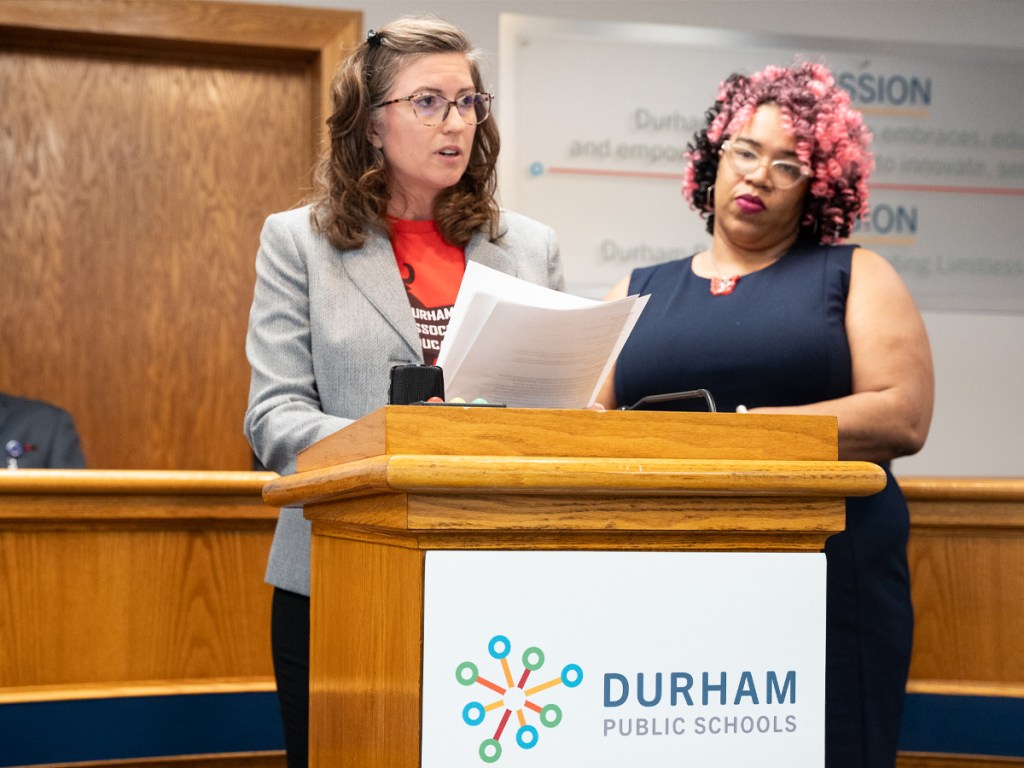In a 4-3 vote after an hours-long discussion last week, Durham Public Schools’ Board of Education approved a historic meet and confer policy—again.
That contentious discussion (see: interruptions, accusations of dishonesty, and an apology over losing one’s cool) brought the April policy (which the board previously passed in, yes, another contentious 4-3 vote) more in line with the version favored by the Durham Association of Educators.
But at a press conference Tuesday—complete with a smiling group photo at the end—all of the involved parties did their best to make sure no journalist could accuse them of any lingering contention.
The triumvirate of school board chair Millicent Rogers, DPS superintendent Anthony Lewis, and Durham Association of Educators president Mika Twietmeyer celebrated the historic policy that gives employee groups guaranteed meetings with the superintendent several times a year (for more on what the meetings will actually look like, check out INDY’s meet and confer explainer).
“We fully support the policy,” Rogers said in response to INDY’s question about unity after the pair of split votes. “Knowing each of my colleagues, the way we vote speaks to the questions, concerns that we have in that moment, and doesn’t speak to our ability to move forward together.”
To Rogers’s point, all board members did vote for versions of the policy—just at different times and in different coalitions in those 4-3 votes.
The April version, which the DAE didn’t support, was the result of a surprise vote called by board member Natalie Beyer, although she noted at the time that the policy could “be modified in the future.” The three board members who voted against approval in April (Joy Harrell Goff, Emily Chávez, and Wendell Tabb) wanted to wait until they had a version that the DAE supported.
Most of that contention in April was around how large a worker group needed to be to gain a seat at the meet and confer table.
Lewis suggested that worker groups, including the DAE, should get a seat if they can demonstrate they represent at least six percent of the district’s non-administrative staff. The DAE countered that other groups operating in bad faith could technically qualify for recognition and ruin the meetings for all the organizations, and suggested a 30 percent threshold. The board settled at six percent.
Last week, Harrell Goff, Chávez, and vice-chair Jessica Carda-Auten led the charge to raise it to 11 percent over the objections of Beyer, Rogers, and Tabb. Bettina Umstead voted for the jump to 11 percent, but expressed discomfort with the process.
DAE represents over 50 percent of DPS workers, and no other organization has demonstrated enough support to reach any of the aforementioned thresholds.
The board members who favored a lower threshold said they were worried about violating a state law that prohibits the board from giving any one employee group “preferential treatment.” On Thursday, Rod Malone, the board’s attorney, tapdanced around endorsing any particular number.
Malone noted that there is no case law to reference if the board is accused of breaking state law because Durham is the first municipality in the state to approve a meet and confer policy.
“[Eleven percent is] probably defensible. But I can’t tell you that 11 percent is definitely defensible. Six is more defensible than 11,” Malone told the board. “Eleven may very well prove to be defensible if challenged. But, I mean, I’m not able to tell you that it will be a slam dunk, but it certainly is in the defensible range. It’s a number that I think we would be able to defend, but we would be much more comfortable defending 6 percent.”
The board also approved third-party certification of member rolls, which the DAE previously called “a common sense norm” to avoid “a violation of employee privacy.”

Though no one at the press conference explicitly said it, the policy is about power. Durham voters elect a school board and give it the power to make policy and appoint a superintendent to execute its vision. Meet and confer is supposed to let groups like the DAE provide input without infringing on the board’s policymaking responsibility or the superintendent’s executive authority.
Through the spring, the DAE changed the balance of power by bringing board members and the superintendent to public meetings to talk through priorities. Beyer, at last week’s board meeting, objected to the DAE’s tactic of asking board members for their opinions on specific priorities “and then going to the superintendent and saying, ‘Because four board members were in favor of something, that is what the superintendent is supposed to do.’”
At the press conference, Rogers told reporters that those types of conversations will continue to happen but in the more structured framework of meet and confer.
“This is Durham,” Rogers said. “If it doesn’t work, we’ll change it.”
Reach Reporter Chase Pellegrini de Paur at [email protected]. Comment on this story at [email protected].
